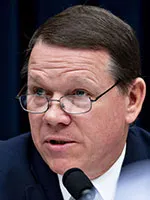Senior Reporter
US House Passes Water Permitting Bill

[Stay on top of transportation news: Get TTNews in your inbox.]
Legislation meant to expedite the permitting process for water infrastructure projects was recently advanced in the U.S. House of Representatives.
House Republicans on March 21 led the passage of the Creating Confidence in Clean Water Permitting Act by a vote of 213 to 205.
Sponsored by senior Republicans on the Transportation and Infrastructure Committee, the measure aims to update as well as enhance the Clean Water Act’s permitting processes. The committee had approved the bill by a party-line vote on Jan. 31.
Committee Chairman Sam Graves celebrated the bill’s passing in the chamber, arguing it “addresses the unfortunate weaponization over the years of the Clean Water Act to delay the permitting and construction of important infrastructure and energy projects.”

Graves
“This bill helps restore Clean Water Act processes that support clean water while also supporting healthy industries like farming, fishing and manufacturing,” added Graves (R-Mo.).
Rep. David Rouzer (R-N.C.), the bill’s primary sponsor, emphasized the legislation’s aim is to “create a predictable and responsible permitting system for American energy and infrastructure development. … This bill is much needed to keep projects on time and on budget — all while maintaining our nation’s clean water infrastructure.”
RELATED: US House to Debate Water Permitting Bill
Rouzer, chairman of the Water Resources and Environment Subcommittee, continued, “By improving the permitting process under the Clean Water Act, we can provide greater clarity for energy producers, farmers, builders, water utilities and many others. Just as significant, we can make America energy dominant on the world stage and lower costs for families.”
🚨As a key component of Energy Week, @HouseGOP just passed my bill, the Creating Confidence in Clean Water Permitting Act!
H.R. 7023 will balance economic prosperity with environmental protection to strengthen American energy independence and lower costs for families. — David Rouzer (@RepDavidRouzer) March 21, 2024
Specifically, the comprehensive bill would codify existing rules and practices associated with the Clean Water Act. According to background information the committee provided: “The bill codifies long-standing, historical interpretation and practice around [nationwide permits] and provides clarity regarding several areas where challenges have risen against the well-established process.”
Democrats on the committee pushed back during the bill’s floor consideration. “This legislation prioritizes the needs of polluters, who want to fast-track questionable projects over the public’s interest and concern,” said Rep. Rick Larsen (D-Wash.), the panel’s ranking member. “What does the bill do for the permitting process? In some cases, it slows down the process. The bill adds bureaucratic steps to the process of establishing water quality standards that will slow the implementation of these standards while exposing them to increased litigation.”

Napolitano
Rep. Grace Napolitano (D-Calif.), ranking member on the Water Resources and Environment Subcommittee, argued, “The bill disregards congressional intent in establishing [the Environmental Protection Agency’s] independent oversight authority over clean water permits; undermines permitting requirements; eliminates judicial review and public engagement; rolls back oversight of mining companies and industrial polluters; inadvertently slows down permit processing with increased bureaucracy; and complicates state-determined decisions.” The bill’s consideration in the Senate has not been scheduled.
In a statement from the Office of Management and Budget, the Biden White House staunchly opposed the bill, claiming it would “create uncertainty, confusion and conflict in permitting processes by: restricting community input and environmental analysis and information that is needed to inform federal decisions to protect the public; curtailing the Environmental Protection Agency’s ability to keep pollutants out of water supplies upon which communities rely; and weakening bedrock environmental protections.”
Key stakeholders, meanwhile, have expressed support for the measure. The Waters Advocacy Coalition argued the legislation would “collectively address key concerns of our industries, ensuring that essential projects are not hindered by bureaucratic delays or uncertainties. [Legislative provisions] support both environmental protection and the need for a more streamlined, predictable regulatory framework.” Coalition members include the American Farm Bureau Federation, American Gas Association, American Road and Transportation Builders Association, American Society of Golf Course Architects, Associated Builders and Contractors and Associated General Contractors of America.
Want more news? Listen to today's daily briefing below or go here for more info:




